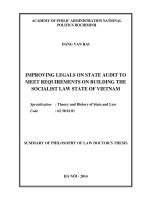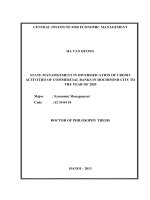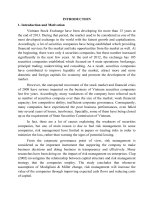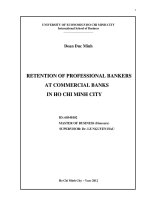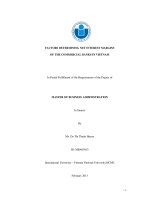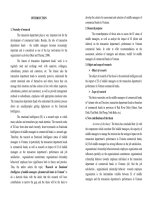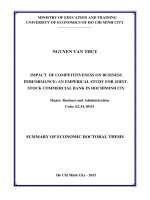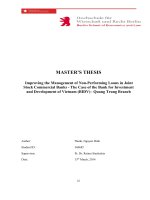Summary of Economic Doctor’s thesis: Completing the content of financial anaysis of listed joint stock commercial banks in Vietnam
Bạn đang xem bản rút gọn của tài liệu. Xem và tải ngay bản đầy đủ của tài liệu tại đây (471.6 KB, 29 trang )
MINISTRY OF EDUCATION AND TRAINING
MINISTRY OF FINANCE
ACADEMY OF FINANCE
=== ===
HOANG THI THU HUONG
COMPLETING THE CONTENT OF FINANCIAL ANAYSIS OF
LISTED JOINT STOCK COMMERCIAL BANKS IN VIETNAM
SUMMARY OF ECONOMIC DOCTOR’S THESIS
Scientific Advisors:
1. Asso.Prof.Dr. Nguyen Nang Phuc
2. Dr. Nguyen Thi Thanh Huong
HÀ NỘI – 2018
The project is completed at the Academy of Finance
Scientific Advisors:
1. Asso.Prof.Dr. Nguyen Nang Phuc
2. Dr. Nguyen Thi Thanh Huong
Criticizer 1: …………………………………………
Criticizer 2: …………………………………………
Criticizer 3: …………………………………………
The thesis will be defensed at the Academy-Level
Thesis Assessment Council at the Academy of
Finance
At
00’ date
The thesis can be searched at:
- National Library
moth
2019
ABBREVIATION
ACB
BIDV
CTG
EIB
MB
NVB
SHB
STB
VCB
Asia Joint Stock Commercial Bank
Vietnam Joint Stock Commercial Bank for
Investment and Development
Vietnam Joint Stock Commercial Bank for
Industry and Trade
Vietnam Export Import Joint Stock Commercial
Bank
Military Joint Stock Commercial Bank
National Joint Stock Commercial Bank
Saigon – HN Joint Stock Commercial Bank
Saigon Thuong Tin Joint Stock Commercial Bank
Joint Stock Commercial Bank for Foreign Trade of
Vietnam
PREAMBLE
In socioeconomic development process in Vietnam, commercial
banks have increasingly played an important role and affirmed their
position as credit intermediaries, payment intermediaries and means of
payment creation in the economy. It can be said that operations of
commercial banks relates to most sectors of the economy. The world
economy in general and Vietnam economy in particular have just
undergone a serious crisis and its focus is the financialbanking system.
Worldwide, a series of large banks like Washington Mutual and
LehmonBrother have collapsed. In Vietnam, before 2012, the economy
and the banking system implemented ambitious growth policies which
led to the consequence that the liquidity of the banking system was in
trouble, the interbank interest rates increased, bad debt increased
rapidly, effectively and profit declined some banks with negative
charter capital included Navibank, Habubank and GP bank. Facing that
situation, the banking industry has been conducting its operational
restructure, causing a disturbance to the whole system and wasting a
great amount of energy and money of the society. Therefore, in the long
term, it is necessary to have management measures for commercial
banks to operate effectively and sustainably.
According to the State Bank's data, as of December 31, 2017,
there were 35 commercial banks in the country, 31 joint stock
commercial banks, of which 10 commercial banks were listed on the
stock market. Therefore, financial situation of commercial banks is
significantly important for shareholders as basis for them to make
decisions. Especially listed joint stock commercial banks which have
favorable conditions in mobilizing investment capital but must ensure
financial conditions given by the State Securities Commission. In
addition, the operation of listed commercial banks is very sensitive to
socioeconomicpolitic changes and vice versa, financial fluctuations of
listed commercial banks have a strong impact on the stock market, to
the whole economy.
Financial analysis is a tool to recognize phenomena, processes
and results of economic and financial activities. Financial analysis of
listed commercial banks provides an assessment of the banks’ financial
situation in the past and at present, thereby predicting the future
financial situation as a basis for economic entities to give decisions in
accordance with their interests. Therefore, financial analysis of listed
commercial banks is important for all economic entities especially in
the current crisis situation.
Thus, listed commercial banks have an important position in the
national economy and financial analysis is an advanced and
indispensable tool for financial management. However, currently
financial analysis of listed commercial banks are still simple, its content
is not comprehensive. This is also one of the causes leading to the crisis
of the financialbanking system.
From a theoretical perspective, there have been a number of
studies on financial analysis and analysis of commercial banks but there
have been no indepth studies on the content of listed commercial bank
financial analysis.
Starting from both theoretical and practical demands, the author
selected the topic "Completing the financial analysis content of listed
commercial banks in Vietnam".
Research object of the thesis: financial analysis content of
commercial banks.
Scope of the thesis research: The thesis focuses on studying the
financial analysis content of commercial banks to provide information
for banking management. Limited to listed commercial banks in
Vietnam in 20132017 period
Research method of the thesis:
Research methods used in the thesis include:
Thesis methodology: Dialectic materialism and historical
materialism of MarxistLeninist philosophy.
Survey: The thesis uses survey method by questionnaire for
commercial banks listed on the financial analysis content.
Qualitative research: used to describe and analyze business
characteristics of commercial banks, factors affecting the content of
commercial bank financial analysis.
Quantitative research: used to process data such as calculating
analysis criteria, using review software to regress and analyze effect of
factors on indicators
Research results of the thesis
Scientifically: The thesis contributes to systematizing and
clarifying the theoretical basis of the financial analysis content of
commercial banks to serve the bank's management, providing
information for investors and public financial supervision of state
management agencies for listed commercial banks.
Practicality: The thesis has summarized and described the
actual situation of financial analysis content in listed commercial banks
in Vietnam today. The thesis proposes solutions to improve the
financial analysis content of listed commercial banks in Vietnam in
accordance with the specific characteristics of listed commercial banks
in our country today.
Thesis structure: In addition to the introduction, conclusion,
references, appendices, the main content of the thesis consists of 3
chapters as follows:
Chapter 1: Basic theories of the financial analysis content in
listed joint stock commercial banks
Chapter 2: Current situation of financial analysis content in
listed joint stock commercial banks in Vietnam
Chapter 3: Solutions to improve the financial analysis content of
listed joint stock commercial banks in Vietnam
CHAPTER 1. BASIC THEORY OF FINANCIAL ANALYSIS
CONTENT OF JOINT STOCK COMMERCIAL BANKS
1.1. OVERVIEW OF JOINT STOCK COMMERCIAL BANKS
1.1.1. Concept, classification of commercial banks
1.1.1.1. Concept of Commercial Banks
After considering, systemizing different views on commercial
banks, the author has the following consideration: Commercial banks
are a monetary enterprise for profit purposes, providing a variety of
financial services with basic operations as receiving deposits, giving
loans and providing payment services. In addition, commercial banks
also provide many other services to satisfy social demand for products
and services
1.1.1.2. Classification of commercial banks
Commercial banks may be classified by criteria:
By economic sectors, including: Stateowned commercial banks,
jointstock commercial banks, jointventure commercial banks, foreign
commercial banks.
By scale of operation, including: unique commercial banks and
network commercial banks
By field of activities, including: specialized commercial banks , multi
sector commercial banks
By business strategies, including wholesale commercial banks, retail
commercial banks, both wholesale and retail commercial banks
1.1.2. Function of joint stock commercial banks
JSB has 3 functions: credit, payment intermediary and money
creation
1.1.3. Business activities of joint stock commercial banks
NHTMCP
JSB has 3 business activities: capital mobilization, credit and
investment, banking service
Operational characteristics of joint stock commercial banks: joint
stock commercial banks are foreign currency trading enterprises, their
operation is to accept and manage risks, joint stock commercial bank an
important capital channel in the economy, the operation of joint stock
commercial banks is highly competitive.
1.2. OVERVIEW OF FINANCIAL ANALYSIS OF JOINT STOCK
COMMERCIAL BANKS
1.2.1. Concept, objectives of financial stock commercial bank
analysis
1.2.1.1. Concept of financial analysis of joint stock commercial
banks
After reviewing and systematizing the views on corporate
financial analysis, the author made a view on the financial analysis of
commercial banks as follows: joint stock commercial bank analysis is
the process of using assessment methods for financial situation of joint
stock commercial banks in the past and at present, thereby predicting
the financial situation of joint stock commercial banks in the future,
thereby facilitating interested people to make economic decisions in
accordance with their interests.
1.2.1.2. Objectives of financial analysis of joint stock commercial
banks
Financial analysis of joint stock commercial banks has a
common goal of providing information on the financial situation of
joint stock commercial banks for decision making.
1.2.2. Factors affecting the financial analysis content of joint stock
commercial banks
Financial analysis of joint stock commercial banks is influenced
by objective and subjective factors. Objective factors include specific
business of commercial banks; general situation of the economy; legal
form of commercial banks; regulations of state management agencies.
Subjective factors include level and experience of analysts; Data quality
as basis for analysis.
1.2.3 Financial analysis methods of commercial banks:
Financial analysis methods of commercial banks can be divided
into 4 groups: group assessment methods, group of factor analysis
methods, group of predictive methods and other method groups.
1.2.4. Database serving financial analysis of joint stock commercial
banks
Financial analysis of joint stock commercial banks uses general
information of the economy, banking industry information and
information of commercial banks. Information of joint stock
commercial banks is reflected in the system of financial statements,
management reports, annual reports, prospectus, ...
1.3. FINANCIAL ANALYSIS CONTENT OF JOINT STOCK
COMMERCIAL BANKS
Financial analysis content of joint stock commercial banks includes 7
groups:
Analysis of capital situation
Analysis of assets
Analysis of capital adequacy situation
Analysis of business situation
Analysis of financial risks
Anlysis of cash flow
Analysis of stock situation
In particular, the analysis of capital situation is divided into 3 sub
contents: general analysis of capital situation, analysis of current capital
situation, analysis of mobilized capital situation. The analysis of asset
situation is divided into 4 subcontents: general analysis of assets,
analysis of profitable assets, analysis of credit capital situation, analysis
of financial investment. Business situation analysis includes analysis of
business results, analysis of capital use efficiency and profitability.
Financial risk analysis includes credit risk analysis, liquidity risk
analysis, interest rate risk analysis and exchange rate risk analysis.
1.4. EXPERIENCES ON MAKING FINANCIAL ANALYSIS
CONTENT OF COMMERCIAL BANKS OF SOME FOREIGN
ORGANIZATIONS.
From the content of joint stock commercial banks' financial
analysis according to Camels model, the World Bank's FSIs and
Standard & Poor’s ranking and evaluation content, the researcher draw
lessons for Vietnam commercial banks as follows:
The financial situation of commercial banks is very concerned
and trusted by organizations in the world.
To enhance their position, Vietnam commercial banks should
apply the analysis content of organizations.
Although the specific criteria of organizations are different,
commercial banks are evaluated through 6 basic contents: capital
safety; property quality; income and profit; liquidity ability; bank risk;
management capacity of banks
CONCLUSION
In Chapter 1 the Researcher has clarified the following contents:
Overview of commercial banks: clarifying concept of
commercial banks and roles of commercial banks in the economy.
Financial analysis of commercial banks: clarifying the nature
and function of financial analysis of commercial banks, factors
affecting the financial analysis of commercial banks, analyzing
structures and methods in commercial banks.
Financial analysis in commercial banks includes seven
contents: analysis of capital situation, analysis of assets, analysis of
capital safety, analysis of business situation, analysis of financial,
analysis of cash flow and analysis of stock situation. For each analysis
content, the PhD student presents: purpose of analysis, criteria and
methods of analysis.
Lessons about construction of financial analysis content of
some foreign organizations.
CHAPTER 2
FINANCIAL ANALYSIS STATUS OF THE LISTED
COMMERCIAL BANKS IN VIETNAM
2.1. OVERVIEW OF THE LISTED COMMERCIAL
BANKS IN VIETNAM
2.1.1. Formation and development of listed joint stock
commercial banks in Vietnam
Until now, the Vietnamese banking industry has
experienced nearly 70 years (from 6/5/1951) of development with
many difficulties but stable and good growth. Over the past
decade, along with the innovation and integration process,
Vietnam's commercial banking system has had many important
changes, the emergence of 100% foreignowned banks and the
gradual elimination of restrictions on operations of bank branches
has made the competition increasingly fierce, leading to the need
of Vietnamese commercial banks to restructure to continue
developing. As of 31/12/2017, commercial banking system of
Vietnam has 35 commercial banks including 4 Stateowned
commercial banks, 5 100% foreignowned commercial banks, 1
policy commercial bank, 1 cooperative bank and 31 joint stock
commercial banks, in which there are 10 banks listed on the stock
market: ACB, BID, EIB, CTG, MB, NCB, SHB, STB, VCB,
VIB. However, VIB has just been listed since 2017, hence it is
not the research subject of the thesis.
2.1.2. Characteristics of management organization in the
listed joint stock commercial banks in Vietnam
The listed commercial banks in Vietnam are established
by the owners contributing capital in accordance with the
regulations of the State Bank. Management structure of the joint
stock banks includes: General Shareholders Assembly, Board of
Directors, Controlling Board, General Director and assisting
apparatus.
2.2. FACTORS AFFECTING THE FINANCIAL ANALYSIS
OF THE LISTED COMMERCIAL BANKS IN VIETNAM
Financial analysis of listed commercial banks in Vietnam
is also influenced by factors as presented in Chapter 1. However,
hereunder the author presents some specific characteristics
factors like: Financial activities of the listed commercial banks in
Vietnam, general situation of Vietnam economy, regulations of
the State management agency.
2.3. FINANCIAL ANALYSIS STATUS OF THE LISTED
COMMERCIAL BANKS IN VIETNAM
2.3.1. Analysis status of capital source
2.3.1.1. General analysis of capital source
Through the realworld survey, 100% of the listed
commercial banks implement the general analysis of capital
source. General analysis of capital source of the listed
commercial banks is carried out on annual and quarterly basis.
2.3.1.2. Analysis of equity
Through the realworld survey, listed commercial banks
found that listed commercial banks do not analyze VTC
indicators separately. Only calculate VTC to calculate CAR
indicator.
2.3.1.3. Analysis of mobilized capital
Regarding mobilized capital analysis, 100% of the listed
commercial banks and carried out the detailed analysis of the
mobilized capital situation through the indicators of scale and
capital mobilization structure. The content of this analysis is used
by banks to evaluate capital mobilization activities a business
activity of the bank. No listed commercial banks use indicators:
Number of mobilized capital cycles; Average term of mobilized
capital; Variation of deposit sources; Cost of mobilized capital.
Analysis of the mobilized capital of the listed commercial banks
reflected in the part "Capital mobilization" of the annual report
and prospectus; reflected in the "mobilized capital" section of
"Financial analysis" on the report of ALCO.
2.3.2. Analysis of assets situation
2.3.2.1. General analysis of assets situation
100% of the listed commercial banks conduct general
analysis of the capital situation through total assets to evaluate the
scale and calculate the asset growth rate to see the growth of the
unit.
In the annual report, banks reflect the total asset data for 5
consecutive years and use a comparison method to compare the
total assets between the last 2 years or between the actual and the
plan. In addition, in internal reports such as reports of the ALCO,
the listed commercial banks and analyzed the situation of assets
by month and quarter. 50% of listed commercial banks calculate
the proportion of some asset items in total assets.
2.3.2.2. The reality of the content of profitable asset analysis
Only 33.33% of the listed commercial banks the situation
of profitable assets, the remaining 66.67% of listed commercial
banks did not analyze profitable assets. The listed commercial
banks analyze the scale of "profitable assets" in the asset quality
section, calculate the proportion of profitable assets compared to
total assets, not the indicator "Total profitable assets/ mobilized
capital". The listed commercial banks use a comparative method
to compare the size of profitable assets and the proportion of
profitable assets between years, between commercial banks of the
same scale. The listed commercial banks analyze profit
generating assets to assess asset quality.
2.3.2.3. Analysis of credit capital situation
According to the survey results, 100% of the listed
commercial banks carry out credit capital analysis. According to
the data calculated by quarter and year, 100% of listed
commercial banks use the indicator "Total outstanding loans" or
"Outstanding loans to customers", 100% of listed commercial
banks use the indicator "Proportion of credit balance of type i".
30% of listed commercial banks use the indicator "Credit
outstanding on mobilized capital"; 1 commercial bank listed as
ACB (accounting for 12.5%) uses the indicator "ratio of
outstanding loans to total assets" and the indicator "outstanding
loans to customers/ customer deposits".
2.3.2.4. Analysis of investment capital situation
Through realworld surveys, banks have the following
results: There are 66.67% of the listed commercial banks to
implement the analysis of investment capital situation. Analysis
of investment capital of the listed commercial banks is performed
every year and quarter to assess investment activities. Regarding
analysis, 33% of listed commercial banks use the "total
investment" indicator and 1 EIB bank (accounting for 11.11%)
analyzes the "bond investment capital" indicator; 1 STB bank
(accounting for 11.11%) calculated the indicator of "capital
contribution ratio to buy shares"; 33% of the listed commercial
banks the analysis of "Investment portfolio structure". Regarding
analysis method: Listed commercial banks only use the
comparison method between the end of the period and the
beginning of the period, compared with the regulations of the
State Bank.
2.3.3. Analysis of capital safety guarantee
According to survey results, 100% of listed commercial
banks perform the analysis of capital safety. 100% of the listed
commercial banks CAR indicators (capital safety ratio and capital
safety ratio 1); 1 commercial joint stock bank STB (accounting
for 11.11%) uses the indicator of "ratio of capital contribution to
share purchase"; 44.44% of listed commercial banks calculate the
indicator "Rate of shortterm capital for medium and longterm
loans"; No listed commercial banks analyzed the indicator of
VTC, VTC/ TS, VTC/ TG. Regarding analysis method, listed
commercial banks use a comparative method to compare banking
data with the standards of the SBV and between the years. Listed
commercial banks do not use factor analysis methods to analyze
the effect of factors on CAR.
2.3.4. Analysis of of business situation
Regarding business situation analysis, the listed
commercial banks and analyzed business results, analyzed the
incomecost structure and analyzed profitability, without
analyzing the "capital use efficiency".
2.3.4.1. Analysis of business results
According to the survey results, 100% of the listed
commercial banks carry out business results analysis. General
analysis of business results of the listed commercial banks is
carried out annually and quarterly. Database to calculate the
indicator is taken from the Report on the performance of listed
commercial banks. Regarding analysis indicator: 100% of listed
commercial banks analyze the "pretax profit", "aftertax profit"
indicators, "net profit from preprovision business activities", "net
interest income", "Operating costs". 66.67% of JSCBs calculate
the proportion of income, no commercial banks will list any cost
ratio. Banks classify income into 2 groups: interest income and
noninterest income.
2.3.4.2. Analysis of capital use efficiency
According to survey results, no listed commercial banks
implement analysis of capital use efficiency.
2.3.4.3. Analysis of profitability
Through the realworld survey of listed commercial banks
with results: 100% of listed commercial banks implement
profitability analysis. 100% of listed commercial banks use the
indicators: ROA, ROE. 33% of listed commercial banks use NIM
and EPS indicators. Regarding analysis method: joint stock
commercial banks often state value the analysis indicator for 35
years, then use the comparison method to compare value of the
indicator between the last 2 years, between reality and the
planning.
2.3.5. Financial risk analysis
Banking business is a special type of business, and risks
to the bank are also unique. Therefore, in general, listed
commercial banks are quite interested in analyzing financial risks
during operation.
2.3.6. Cash flow analysis
There are no listed commercial banks implementing the
analysis of cash flow.
2.3.7. Analysis of stock situation
100% of listed commercial banks published information
about the stock situation on the bank's website. Illustrations,
information about stocks on BID and CTG's website
2.4. Evaluation of financial analysis of listed joint stock
commercial banks in Vietnam
2.4.1. Achievements
The listed commercial banks have fully implemented the
analysis contents (6/7 contents), including analysis of capital
sources, analyzing asset models, analysis of capital safety and
distribution, analysis of business situation (specifically, analysis
of business results and profitability analysis), financial risk
analysis (specifically, credit risk analysis, interest rate risk,
liquidity risk) and currency risk), analyze stock situation. For
each content, listed commercial banks have used a number of
certain analytical indicator, have used mainly the graph method to
reflect the value of the analysis indicators in a common period of
3 5 years and comparative method to compare between 2
consecutive years, between the actual and the plan and between
the listed commercial banks with the regulations of the State
bank.
2.4.2. Shortcomings of financial analysis of the listed joint
stock commercial banks in Vietnam
Through surveying the current situation of financial
analysis of the listed commercial banks, it can be seen that the
analysis only stops at the general and general analysis, has not
deeply analyzed the causes affecting the variable dynamics of the
analysis indicator. Analysis mainly provides information for State
management agencies, investors, but does not really provide
information to financial management of commercial banks. On
the other hand, the analytical content is only at a simple level,
there is no link between the relevant analytical indicators to give
advice to managers in making the right decisions in the future. .
Many of the analytical contents only give indicator data without
evaluation. Analysis indicators are not consistent among banks,
making difficult to compare banks. There are no listed
commercial banks conducts analysis of cash flow
2.4.3. Reasons of shortcomings
Shortcomings of financial analysis of listed commercial
banks stem come from objective and subjective reasons.
Objective reasons such as the limited development of the
stock market, the accounting and financial regulations in general
are constantly changing; State management responsibility and
effectiveness in the information disclosure regulations of listed
commercial banks is still low; management and ownership
functions of the State management agency have not been clearly
defined.
Subjective reasons such as: awareness of the role of
financial analysis tools in the management of commercial banks
is limited; operation of financial analysis in commercial banks is
not satisfactory; lack of personnel to perform analysis.
CONCLUSION OF CHAPTER 2
Chapter 2 has presented an overview of the formation and
development, financial situation of the listed commercial banks in
Vietnam nowadays; brief of regulations of the State management
agency on financial analysis of the listed joint stock commercial
banks; survey of the actual situation of financial analysis of the
listed commercial banks in Vietnam.
Through the research, survey, review and evaluation of
financial analysis of the listed commercial banks in Vietnam,
results of financial analysis of the listed commercial banks in
Vietnam have been shown up. However, indeed besides the
achieved results, there are still problems in financial analysis of
the listed commercial banks in Vietnam such as: the analysis only
performed at a simple level, not deeper into the analysis of
reasons of influence to propose necessary solutions to help
management making decisions, not fully use analysis method
such as Dupont method and using econometric models to
consider the relationship between policies... The author has given
the reasons of shortcomings in applying financial analysis in
currently listed commercial banks in Vietnam, which served as
the prerequisite for improving financial analysis of the listed
commercial banks in Vietnam.
CHAPTER 3
SOLUTIONS FOR COMPLETING FINANCIAL
ANALYSIS OF THE LISTED COMMERCIAL BANKS IN
VIETNAM
3.1. DEVELOPMENT ORIENTATION OF COMMERCIAL
BANK AND REQUIREMENTS, PRINCIPLES OF
COMPLETING FINANCIAL ANALYSIS OF THE LISTED
COMMERCIAL JOINT STOCK BANKS IN VIETNAM
3.1.1. Development orientation of Vietnam commercial banks
On August 8th, 2018, the Government issued Decision No.
986/QDTTg on development strategy of Vietnam banking sector
until 2015, orientation to 2030. The strategy clearly states the
view of the Government. The monetary, banking and operation
system of credit institutions is the matter of national economy,
continues to play a key role in the overall financial system of
Vietnam... The strategy also figures out specific goals with
solutions and implementation schedule for each period, expected
to open a new period of banking industry. Development strategy
is divided into 3 phases: 20182020; 20122025 and 20252030.
3.1.2. Requirements and principles to improve financial
analysis of the listed joint stock commercial banks in Vietnam
3.1.2. Requirements of completing financial analysis of the
listed joint stock commercial banks in Vietnam
Completion of financial analysis of the listed commercial
bank must meet the requirements of financial management; as the
basis to assess the quality of financial operations of banks;
completion content must be general and specific at the same tine
to meet the information needs of subjects; completion content
must be in line with the state management and control mechanism
and international practice.
3.1.2.2. Principles to complete the financial analysis of the
commercial banks
Completion of analysis content must ensure the
principles: appropriation, consistency, honesty and responsibility,
feasibility and effectiveness.
3.2. COMPLETION OF FINANCIAL ANALYSIS OF THE
LISTED COMMERCIAL BANKS IN VIETNAM
From the limitations of the content of financial analysis of
listed commercial banks, the author has proposed solutions for
completing. Completion solution is subject to each indicator and
analysis method.
3.2.1. Completion of the capital situation analysis content
Regarding general analysis of capital situation: the
author proposed the listed commercial banks need to analyze the
scale and structure of all major items on the balance sheet.
Regarding VTC situation analysis: the author proposed
the listed commercial banks to supplement this content.
Illustration should be made through VTC analysis of BID.
Regarding the analysis of the mobilized capital situation:
the author proposed the listed commercial banks to fully use the
mobilized capital analysis indicator in Chapter 1. In addition, the
author supplemented a way to analyze mobilized capital by
primary market (M1) and secondary market (M2)
3.2.2. Completion of the asset analysis content
Regarding the general analysis of assets: the author
proposed the listed commercial banks to analyze the scale and
proportion of all large items belonging to the assets.
Regarding profitability asset analysis: the author
proposed the listed commercial banks to complete the analysis
indicator.
Regarding credit analysis: the listed commercial banks
need to improve and approve on how to calculate analytical
indicator. In addition, the author proposed to classify and
evaluate credit capital according to primary and secondary
markets. After that, compare the mobilization and credit capital in
each market.
Analysis of financial investment: listed commercial
banks need to complete the analysis indicator. The author
supplemented the indicator "Bad investment ratio on bonds".
3.2.3. Completion of the capital safety analysis
In this content, The author proposed to supplement the
"Regular funding coefficient" and illustrates the method of
econometric analysis: using Eview software to analyze the factors
affecting CAR
3.2.4. Completion of business analysis of the listed joint stock
commercial banks
Analysis of business results: The author proposed to
illustrate the content of analyzing the structure of income and
expenses of commercial banks
Analysis of capital use efficiency: The author analyzed
and illustrated this content through CTG data.
Regarding profitability analysis: listed commercial
banks need to improve the content and analysis method. The The
author supplemented the indicator of analyzing profitability.
Illustrate the Dupont method in CTG ROE analysis.
3.2.5. Completion of financial risk analysis of the listed joint
stock commercial banks in Vietnam
In this content, the author proposed listed commercial
banks to fully use the analysis indicator in chapter 1 and have
comments.
3.2.6. Completion of the cash flow analysis
The listed commercial banks need to supplement this
content to understand their true financial situation. The author
used CTG data to analyze and illustrate this content.
3.2.7. Completion of the stock situation analysis
The author proposed the listed commercial banks to
calculate and fully evaluate indicators reflecting the stock
situation.
3.3. CONDITIONS FOR IMPLEMENTING SOLUTIONS
TO COMPLETE FINANCIAL ANALYSIS OF THE
LISTED COMMERCIAL BANKS IN VIETNAM
3.3.1. Regarding the State
Firstly, continue to improve the legal environment,
creating a legal basis for banking business
Secondly, the State Bank should build a system of
indicators of financial analysis of commercial banks with
guidelines, uniform regulations on calculation methods so that
they are both scientific and suitable with current conditions. .
Thirdly, the State Bank should cooperate with the
Ministry of Finance to continue researching and amending the
banking accounting system in principle to meet the requirements
of the market economy in accordance with international
accounting standards.
Fourthly, the State Bank should assign the Information and
Information Center of the State Bank to study the current
operating environment of Vietnamese commercial banks, conduct
analysis, evaluation and publication of financial information of
some key indicators to reflect the actual situation of business
operations, financial situation of the banking sector in general and
of each group of banks with similar scale and conditions.
3.3.2. Regarding the joint stock commercial banks
Firstly, it is important to raise awareness about financial
analysis;
Secondly, continue training for personnel conducting
analysis;
Thirdly, developing an updated, complete information
system;
Fourthly, providing equipment and technical facilities
serving the analysis.
CONCLUSION OF CHAPTER 3
Theoretical researches on financial analysis and financial
analysis contents against commercial banks in chapter 1, as well
as the evaluation of financial analysis situation in chapter 2, have
contributed to figure out the advantages and shortcoming, reasons
of shortcomings, especially the reference to the financial analysis
experience of some foreign organizations to draw lessons learnt
for Vietnam. Chapter 3 has introduced and analyzed the
orientations, principles of completion of financial analysis
content over Vietnam's listed commercial banks nowadays, as
well as conditions for implementing these solutions for the State,
management agencies and joint stock commercial banks of
Vietnam.
CONCLUSION
The listed commercial banks play an important role in the
national economy: bank is the critical matter of the economy,
assuming the role of providing capital for the needs of
industrialization and modernization; generating jobs for laborers
and especially this is one of the factors to lead Vietnam stock
market. Nowadays, banking is a sector that needs to change to
suit with international practice to survive in an increasingly fierce
competition environment that contains many risks of an open
integrated economy to meet the increasing demanding of
customers. The Government and the State Bank of Vietnam have
been implementing the restructuring of the banking industry to
eliminate weak banks through the acquisition, consolidation or
merger into major banks to create a healthy banking system; At
the same time, State Bank of Vietnam required commercial banks
to apply international practices and standards on banking
management. Therefore, in order to survive and develop,
commercial banks in general and listed commercial banks in
particular must improve bank management capacity; make good
use of financial analysis tools to assess the financial situation,
financial strength as well as the potential risks in their operations,
forecast the future, thereby set out suitable financial and business
strategy. Therefore, the thesis has studied the financial analysis of
the listed commercial banks in Vietnam to enhance the
effectiveness of financial analysis in these units.
